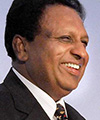Inaugural Address at the Kerala Economic Association
Speaking Notes of former Ambassador T.P.Sreenivasan for the Inaugural Address at the First Anniversary of the Kerala Economic Association, Kochi on May 8, 2015.I am afraid my stepping into the shoes of the Chief Minister of Kerala to inaugurate the annual Conference of the Kerala Economic Association is not very appropriate. The only thing common between the Chief Minister and myself in this context is that neither of us is an economist. Perhaps, the organizers did not want an economist to inaugurate the Conference and thus the choice may have fallen on me.
A former President of France, Francois Mitterrand was asked as to how many books on economics he had on his bookshelf and he answered “none!” I am not very different as I have very few books on economics. Moreover, I have lived away from Kerala for nearly 40 years and all that I know about Kerala’s economic development is from paper. I have ben reading about the unique Kerala Model and feeling proud of it.Having come back to live in Kerala, I get the feeling that Kerala’s economic development is more impressive on paper than in reality.
The famed high literacy rate in Kerala has not translated into better educational standards. We have just been through the SSLC results fiasco, revealing poor educational standards and inadequate expertise in handling computers. Our health indicators on paper do not match with the conditions in any Government hospital. One wonders whether the Kerala Model refers to a bizarre anomaly that the economists discovered in Kerala. With a fairly low economic growth, Kerala managed to develop the educational and social sectors. This could be attributed to the priorities of the rulers of Travancore and subsequent democratic leaders, supported by the missionaries, social reformers and community leaders, who gave special attention to education and health. One of them, Rani Gauri Parvati Bai declared long ago that it was the responsibility of the state to defray the cost of education of every citizen. The protests against the caste system took the form of mass education reform, which also helped.
Kerala’s achievements in health and education have received attention worldwide. In spite of low per capita income, Kerala has low infant mortality, high literacy, high life expectancy, access to education, poverty reduction, palliative care and other indicators, which prompted a famous economist to remark, “Though mostly a land of paddy covered plains, Kerala stands out as the Mount Everest of social development.” It was the Kerala Model that led to the UN Development Index, mainly because of the influential economist, Amartya Sen, who was an admirer of the Kerala Model.
What we have achieved may have impressed external observers, but we could have achieved more if we had followed our tradition of tolerant pluralism and gender equality. We seem to have developed a mindset somewhere down the line, which resists change, even globalization, which has brought in opportunities and challenges. The general resistance to change has pervaded all sectors, including education. The stagnation and deterioration in the education system is appalling. The other day, an educationist declared that he would not allow any change in a particular college! This is when education is changing rapidly in every part of the world and we remain frozen in time in many areas of education. It is evident that a new political strategy is necessary to take the state forward.
The recent debate between two giant economists, Jagdish Bhagwati and Amartya Sen was fascinating in the context of our development. Bhagwati attacked the Human Development Index and argued that Kerala’s success in improving social outcomes had little to do with state policies. He preferred the Gujarati model of development, which focused on creation of prosperity and social spending. Sen felt that the Gujarat model would increase inequalities and hurt the minorities. The lesson we should learn from the debate is that we should strive for economic growth, while preserving our tradition of social spending and better distribution of wealth.
I would go one step further and say that Kerala should aim at following a big idea of Gross Domestic Happiness (GDH) as against Gross Domestic Product (GDP) put forward in 1971 by a tiny country, Bhutan. The idea was seen as an oddity, but now there is general recognition of this approach, which emphasizes the spiritual, physical, social and environmental health of citizens. Bhutan has made nature conservation and sustainability at the heart of the political agenda. Bhutan’s record of doubling life expectancy, all children in schools, equitable social development, cultural promotion and conservation of the environment has given Bhutan the mythical status of a real life Shangri La. The world has begun to recognize the idea of Gross Domestic Happiness.
I am sure that the Kerala Economic Association will discuss these and other issues at its annual session. I was surprised that the KEA is only a year old. But apparently, Kerala economists have been active in the national level association over the years. I am happy to inaugurate the Conference and wish you well in your deliberations.
Thank you.
